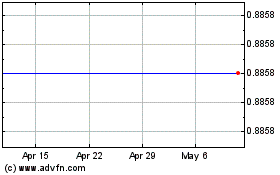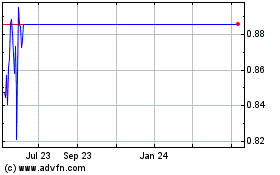By Aruna Viswanatha, Max Colchester and Jenny Strasburg
In a 12-hour flurry just before Christmas, two big European
banks settled mortgage-securities probes with the U.S. Justice
Department, agreeing to pay $12.5 billion. Another didn't, and it
got sued.
The divergent paths represent the distinct fortunes of Deutsche
Bank AG, Credit Suisse Group AG and Barclays PLC, and the unique
pressures to resolve a cluster of long-running investigations
before the arrival of a new and unpredictable presidential
administration.
The chief executive of Barclays, which resisted a settlement and
was sued, had made plain in private talks for months he'd risk a
fight. Deutsche Bank, the weakest of the three, was keen to settle
but couldn't afford a big bill. Credit Suisse also wanted to put an
end to its investigation.
Many major investment banks, in both Europe and the U.S., had
been caught up in fraud allegations over the selling of
precrisis-era mortgage-backed securities. U.S. banks have been
reaching settlements, coughing up billions, over the past few
years. This summer, the Justice Department turned up the heat on
European banks. Yearslong investigations unearthing potentially
damaging recordings and emails were nearing an end.
Barclays was pushing back. In October, during the International
Monetary Fund meetings in Washington, Barclays chief Jes Staley
told colleagues and investors that the British bank was willing to
go to court if the Justice Department kept pushing for a number he
considered too high, according to a person familiar with the
matter.
Mr. Staley, an American investment banker who took over Barclays
late last year, suggested he felt Barclays had options, something
investors might not allow for Deutsche Bank. The German lender is
more acutely cash-strapped -- its cost-cutting efforts and
turnaround strategy have remained less convincing to investors than
Barclays's have. The German bank still has other major pending
legal negotiations to hammer out in the U.S., crimping its ability
to hardball authorities, investors and analysts say.
Early this week, a flurry of activity came to a head. Credit
Suisse reached a tentative agreement to settle, but held off on
disclosing it while negotiators worked out details, according to
people close to the talks.
But Barclays executives were digging in their heels. They
thought the Justice Department wasn't offering a settlement
proportionate to the British bank's involvement in the
mortgage-backed securities market, officials say.
Analysts were estimating that a settlement of $1 billion to $2
billion would be a palatable outcome for Barclays, but the Justice
Department said $5 billion was in the range of possibilities,
according to people familiar with the matter. Justice Department
officials argued that a big penalty was appropriate because the
bank allegedly knew that billions of dollars of mortgages it had
included in the securities didn't meet standards.
The Christmas break loomed. Inside the Justice Department, a
view had been growing that officials needed to actually sue a bank,
rather than merely threaten, or else bankers would simply continue
to stall and resist a settlement, people familiar with the
discussions said.
On Thursday, Barclays's Mr. Staley and the bank's general
counsel spoke to the Justice Department's No. 3 official, Bill
Baer, to discuss if there was a path to a deal. The call ended with
Mr. Baer alerting them a lawsuit would be filed later in the day,
according to a person familiar with the matter.
Meanwhile, Deutsche Bank and the government were racing to a
deal. In the afternoon, they reached a tentative accord. Twenty
minutes later, the Barclays lawsuit landed in a Brooklyn federal
court. It accused Barclays of fraud in issuing securities backed by
more than $30 billion in mortgages from 2005 to 2007.
The lawsuit alleges that the bank ignored warnings from
companies hired to conduct due-diligence checks on the mortgages.
"These vendors described some of these securitized loans as
'craptacular,' others as 'scariest collateral,' and others as
having the 'distinct aroma of default,'" the suit says.
Within several hours, Deutsche Bank publicly announced it had
reached an agreement to pay more than $7 billion. The announcement,
which landed at 2:30 a.m. Zurich time, surprised some Credit Suisse
lawyers and executives, who hadn't realized the German bank was so
close, a person familiar with the matter said.
The news spurred the Swiss bank to alert the Justice Department
that the bank wanted to move swiftly to announce its own deal by
morning, people close to the discussions said. Credit Suisse didn't
want to be the only one of the three banks without an announcement
when the markets opened in Europe, one of the people said.
Barclays said in a statement that it would seek the suit's
"dismissal at the earliest opportunity," and that it considers the
claims "disconnected from the facts."
Barclays fell 1% in Friday trading. Deutsche Bank shares, which
had been up 4% earlier in the day, were up 0.4%. Credit Suisse
shares were down 1%.
Investors have focused most strongly on Deutsche Bank, which is
struggling to mount a turnaround and can't afford to pay large cash
penalties to settle legal bills. Thursday's deal had some good news
for the German bank: Of the penalty, $3.1 billion is in cash, and
the rest, another $4.1 billion, is in the form of recompense to
consumers that can be spread over five or more years. Tax benefits
can also reduce its cost, and ultimately a fraction of that amount
could come out of the bank's pocket, bank officials have told
investors.
"Christmas comes early," Stuart Graham, a banking analyst with
Autonomous Research in London, said in a Friday morning note about
Deutsche Bank. Other fines are outstanding, he wrote, "but Deutsche
should rightly be relieved to get its biggest case settled at a
very reasonable cost."
Analysts and investors are divided over whether Deutsche Bank
might still need to raise capital in early 2017 -- estimates for a
potential increase start at around $5 billion -- despite continued
insistence from the bank that now isn't the time. Executives have
said they have no immediate plans to raise capital.
Credit Suisse said it agreed to pay about $5.3 billion to close
the probes -- a $2.48 billion penalty plus consumer relief of
around $2.8 billion over five years.
--Devlin Barrett contributed to this article.
Write to Aruna Viswanatha at Aruna.Viswanatha@wsj.com, Max
Colchester at max.colchester@wsj.com and Jenny Strasburg at
jenny.strasburg@wsj.com
(END) Dow Jones Newswires
December 23, 2016 15:14 ET (20:14 GMT)
Copyright (c) 2016 Dow Jones & Company, Inc.
Credit Suisse (NYSE:CS)
Historical Stock Chart
From Mar 2024 to Apr 2024

Credit Suisse (NYSE:CS)
Historical Stock Chart
From Apr 2023 to Apr 2024
